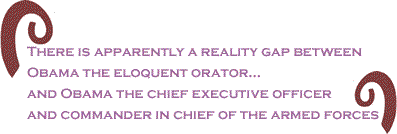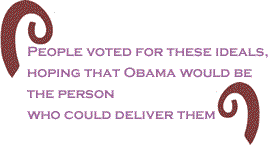
|
||||||||||||||||||||||
|
||||
 |
||||
As
we approach the one year anniversary of President Obama�s inauguration
as president, there is a lot of disagreement about his role since
he took office. Many progressive and leftist activists and scholars
(I use this loosely to include left leaning writers and researchers)
have been trying to figure out Obama�s real impact on the social
movements in the However there is apparently a reality gap between Obama the eloquent orator on the one hand and Obama the chief executive officer and commander in chief of the armed forces on the other. Yet it is not so simple. As Obama campaigned for president he carefully crafted his speeches to demarcate himself from the right-wing, ala Bush and McCain. Yet his messages were interpreted differently by different people. It is almost as if he spoke to everyone distinctly. But, I think many leftists and progressives inferred from his speeches that Obama is progressive. Everyone
heard Obama speak, but I�m afraid some people did not listen. The
most obvious example was when people were disappointed that President
Obama would escalate troops in In
other words the rhetoric of change may sound good, but we are not
experiencing significant change from the Obama White House. On the
other hand, what we witnessed from the 2008 voting results is that
people voted in great numbers to defeat the right-wing in American
voters were tired of this. They decided that the right-wing in So
I would argue that in spite of Obama�s lack of true commitment to
the ideals that he professed, that he objectively inspired a movement
that was for expanded democracy, accessible health care, pro-peace,
in favor of racial, ethnic and gender equality and supported the
rights of people with different sexual orientations. People voted
for these ideals, hoping that Obama would be the person who could
deliver them. I would also argue that the fact that so many people
gathered under this (pro-democratic) umbrella was a positive phenomenon
in the The
reality is that if there is a hope of making significant changes
to To conclude, we should celebrate Obama�s election as president as a significant blow against a history of racism, ethnic oppression and the right-wing. But the battle is not over yet. The struggle must continue. BlackCommentator.com Guest Commentator, Joe Navarro, is a 21st century Chicano activist teacher and poet. Click here to contact Mr. Navarro. |
||||
 |
||||
If you would like to comment on this article, please do so below. There is a 400 character limit. You do not need a FaceBook account. Your comment will be posted here on BC instantly. Thanks. Entering your email address is not mandatory. You may also choose to enter only your first name and your location.
|
||||
Thank you very much for your readership. |
||||
| Any BlackCommentator.com article may be re-printed so long as it is re-printed in its entirety and full credit given to the author and www.BlackCommentator.com. If the re-print is on the Internet we additionally request a link back to the original piece on our Website. | ||||
| |
||||
Issue 358 |
| Executive Editor: Bill Fletcher, Jr. |
| Managing Editor: Nancy Littlefield |
| Publisher: Peter Gamble |
| Est. April 5, 2002 |
| Printer Friendly Version in resizeable plain text format |
 |
 |
 |

|
 |
| |
| |

































 In
one vote large numbers of people voted against a history of slavery,
Jim Crow, genocide, land theft, imperialist aggression, racism,
sexism, xenophobia and homophobia.
In
one vote large numbers of people voted against a history of slavery,
Jim Crow, genocide, land theft, imperialist aggression, racism,
sexism, xenophobia and homophobia.









